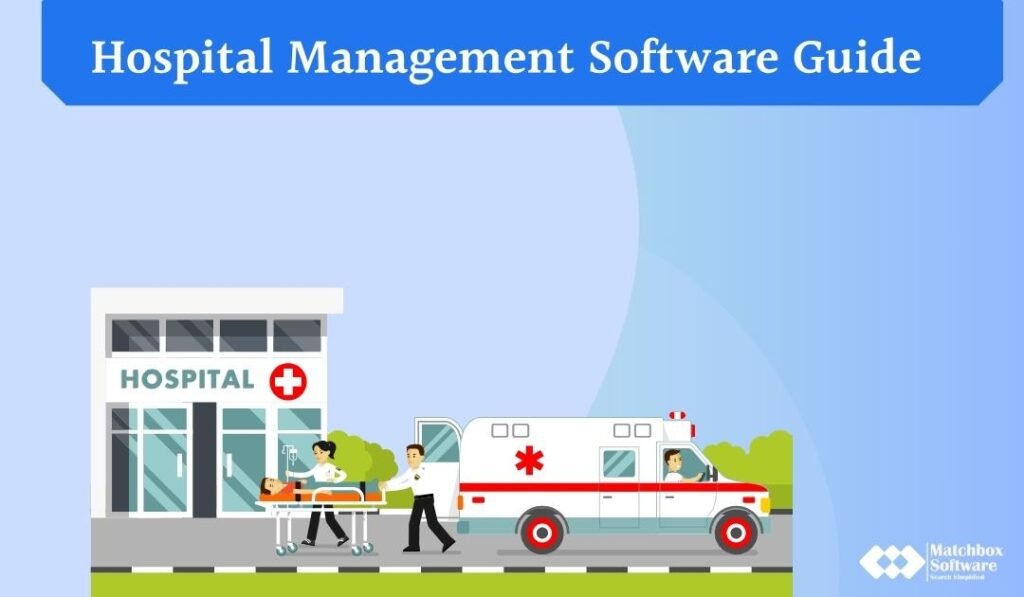Best Hospital Management Software
Revolutionize healthcare with our Hospital Management software. Streamline operations, enhance patient care, and optimize resources. Empower your hospital with efficiency, accuracy, and innovation. Discover the future of healthcare management.
Featured Softwares
List of 10 Best Hospital Management Software
Have Questions? We can help!
Get personalized recommendations from our experts on call!
Top Trending Softwares

AHMS
AHMS, or the Acronym Hospital Management System, is a software solution designed to provide relevant information and support effective decision-making within a hospital or healthcare facility.
Table of Contents
What is Hospital Management Software?

Hospital Management Software, often abbreviated as HIMS, is a specialized computer program designed to streamline the management of healthcare facilities. Whether you’re a physician, hospital administrator, or clinician, this software is valuable for efficiently handling various aspects of hospital operations. One of its core objectives is to eliminate the reliance on traditional paper-based processes, ushering in a more digital era for hospitals. This is achieved by centralizing and integrating patient, physician, and staff information, eliminating the need for cumbersome paper documentation. HIMS software simplifies and modernizes hospital management, offering a seamless and paperless solution.
What are the features of Hospital Management Software?
A hospital management system (HMS) is a software application that helps hospitals manage their operations. It typically includes features for patient management, appointment scheduling, electronic medical records (EMRs), billing and invoice management, staff and doctor management, inventory management, and report generation.
Here are some of the critical features of a hospital management system:
• Patient management: This includes features for registering patients, tracking their medical history, and managing their appointments.
• Appointment scheduling: This allows patients to book online or over the phone and helps hospitals track appointment availability and manage patient wait times.
• Electronic medical records (EMRs): This stores patient medical records in a digital format, making it easy for doctors and other healthcare providers to access and share information.
• Billing and invoice management: This handles the financial aspects of patient care, such as generating invoices, tracking payments, and managing insurance claims.
• Staff and doctor management: This helps hospitals track the availability of staff and doctors, manage their schedules, and track their performance.
• Inventory management: This helps hospitals track the inventory of supplies and equipment and ensure they have the necessary items on hand.
• Report generation: This allows hospitals to generate reports on various topics, such as patient demographics, utilization rates, and financial performance.
• Telehealth: This allows patients to consult with doctors remotely, using video conferencing or other technologies.
• Compliance with regulations: This helps hospitals comply with government regulations related to patient privacy and safety.
• Data analytics: This helps hospitals analyze data from their EMRs and other systems to improve patient care and efficiency.
The specific features of a hospital management system will vary depending on the size and needs of the hospital. However, the features listed above are some of the most common and essential elements in most HMSs.
What are the benefits of Hospital Management Software?
Here are some benefits of using a hospital management system:
• Improved efficiency: An HMS can help hospitals improve efficiency by automating many manual tasks involved in patient care, such as scheduling appointments and managing inventory.
• Increased accuracy: An HMS can help to improve accuracy by reducing the risk of errors in patient records and billing.
• Enhanced communication: An HMS can help to improve communication between patients, doctors, and other healthcare providers by providing a centralized repository for patient information.
• Improved patient care: An HMS can help improve patient care by providing doctors access to patient information from anywhere and making it easier to track patient progress.
• Reduced costs: An HMS can help to reduce costs by streamlining operations and eliminating wasted time and resources.
Overall, a hospital management system can be a valuable tool for improving a hospital’s efficiency, accuracy, communication, and patient care.
What Types of Hospital Management Systems Are Available?
Hospital management systems come in various forms, catering to diverse needs within the healthcare industry. They can range from specialized standalone solutions to comprehensive platforms encompassing various healthcare management functions. Here’s an overview of some common types of HMS software:
1. Electronic Health Records (EHR) Software:
Electronic Health Records (EHR) systems are designed to store and manage patient information efficiently. As a digital replacement for traditional patient registers, EHR software allows for secure and organized patient data storage, prioritizing confidentiality with robust security features.
2. Practice Management Software (PMS):
Practice Management Software (PMS) is tailored for solo doctors and clinicians, offering essential hospital management features such as appointment scheduling, EHR capabilities, billing, and more. Specialized versions are available for different medical specialties like dentistry and psychiatry.
3. Lab Information Management System (LIMS):
Lab Information Management Systems (LIMS) are specifically designed for laboratories. These systems facilitate sample collection, inventory management, and accounting functions while incorporating automation features to streamline lab workflows.
4. Comprehensive Hospital Management Systems:
For those seeking an all-in-one solution that combines the functionalities of the systems above, hospital management system software provides an ideal choice. These comprehensive platforms encompass various healthcare management modules, including EHR, practice management, patient management, billing, etc.
In summary, the types of hospital management systems available cater to varying needs within the healthcare sector, offering specialized solutions and comprehensive platforms to enhance operational efficiency and patient care.
Factors to Consider When Purchasing Hospital Management Software
Here are some of the things to consider when purchasing a hospital management software:
• Your hospital’s needs: The first step is to identify your hospital’s specific needs. What are the most essential features that you need the software to have? What are your budget constraints?
• The type of system: There are two central hospital management systems: cloud-based and on-premises. Cloud-based systems are typically more affordable and easier to maintain, but they may offer a different level of security than on-premises systems. On-premises systems give you more control over the system but require more upfront investment and maintenance.
• The vendor: Choosing a reputable vendor with a good track record of providing quality software and support is essential.
• The features: The software should have the necessary parts to manage your hospital effectively. The most important features include patient management, appointment scheduling, billing and invoice management, staff and doctor management, inventory management, and report generation.
• The integrations: The software should be able to integrate with other systems you use, such as your electronic health record (EHR) system. This will help to streamline your workflow and improve efficiency.
• Training and support: The vendor should provide training and support to help you get started with the software and troubleshoot any problems.
• The cost: The cost of the software will vary depending on the features, the type of system, and the vendor. It would help if you got quotes from multiple vendors for the best price.
What is the top Hospital Management Software?
• Cerner Millennium: Cerner Millennium is a cloud-based HMS used by over 2,000 hospitals worldwide. It offers many features, including patient management, appointment scheduling, billing and invoice management, staff and doctor management, inventory management, and report generation.
• Epic: Epic is another cloud-based HMS used by over 2,500 hospitals worldwide. It is known for its ease of use and integration with other systems.
• Allscripts Sunrise: Allscripts Sunrise is an on-premises HMS used by over 1,000 hospitals worldwide. It offers many features, including patient management, appointment scheduling, billing and invoice management, staff and doctor management, inventory management, and report generation.
• Meditech Expanse: Meditech Expanse is an on-premises HMS used by over 1,000 hospitals worldwide. It is known for its flexibility and ability to meet specific hospitals’ needs.
• Siemens Healthineers Soarian: Siemens Healthineers Soarian is a cloud-based HMS used by over 500 hospitals worldwide. It offers many features, including patient management, appointment scheduling, billing and invoice management, staff and doctor management, inventory management, and report generation.
These are just a few of the many hospital management software solutions available. The best answer for your hospital will depend on your specific needs and requirements.
When choosing a hospital management software, it is essential to consider the following factors:
• The size and complexity of your hospital
• Your budget
• The features that are most important to you
• The level of support that you need
• The integrations that are required
It is also essential to research and compare different solutions before deciding. You can read reviews, talk to other hospitals, and get software demos.
Choosing the right hospital management software can be complex but essential. By carefully considering your needs and requirements, you can select a system that will help you improve the efficiency and effectiveness of your hospital.
Hospital Management Software is a comprehensive digital solution that streamlines and automates various administrative, clinical, and financial processes within a healthcare facility, improving efficiency and patient care.
Hospital Management Software enhances operational efficiency, reduces errors, and improves patient experiences by simplifying appointment scheduling, billing, medical records management, and more.
Our Hospital Management Software can be tailored to suit your hospital’s unique requirements, ensuring a seamless fit with your existing workflows and processes.
Our Hospital Management Software is designed to comply with industry regulations like HIPAA and offers robust security features to safeguard patient data.
We provide comprehensive training for your staff to ensure they can effectively use the software. Additionally, our dedicated support team is available to assist with any issues or questions that may arise.

